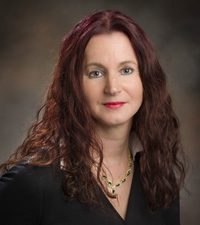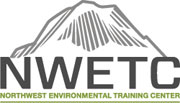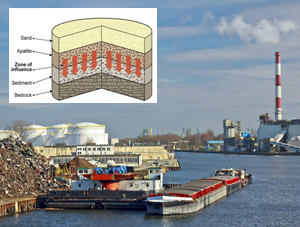|
Description:
**Note - This course is now offered exclusively using live stream remote attendance. You will need a computer and an internet connection. If you would like more information or have any questions, please contact us via email or phone 425 270 3274. Contaminated sediment poses difficult assessment and remediation challenges but recent improvements in methodologies offer much promise. New assessment methods and improved remediation technologies that directly address contaminant mobility and bioavailability have enhanced our ability to effectively manage sediments. Advantages include reduced cost and improved effectiveness over conventional methods. In this two-day class, we will address both conventional and emerging technologies for remediating contaminated sediments including removal followed by treatment and disposal; in situ isolation of the sediments from the environment by covering the sediment with neutral materials (i.e., passive capping); active capping technologies, and monitored natural recovery, which involves monitoring processes that isolate, degrade, transform, and immobilize sediment contaminants under natural conditions. The course will address solutions to contaminants in both marine and freshwater sediments including the effects of remediation on the benthic environment. Emerging technologies that address contaminant toxicity, biogeochemistry and transport mechanisms will also be highlighted. The class will incorporate new approaches for including bioavailability in risk assessments and the evaluation of remedial effectiveness. Bioavailability controls the transfer of contaminants from sediments to ecological receptors and humans and can rarely be predicted from total contaminant concentrations alone. Successful evaluation of bioavailability involves the selection of analytical methods that are suitable for the organisms and sediment environments under consideration and often involves a weight-of-evidence that incorporates multiple lines of evidence. Although problems remain, contaminated sediment management/remediation is improving due to the control and elimination of contaminant sources, development of new remedial technologies, and selection of analytical methods to evaluate metal bioavailability. After completing this class, participants will be able to: - Distinguish sources and types of contaminants at the sites
- Determine fate and transport of contaminants
- Understand current remediation strategies and new approaches
- Identify remediation effectiveness: defining, monitoring, and demonstrating success
- Apply chemical/toxicological/biological measurements to characterize the site before/after the remediation
- Understand the selection of remedial technology
- Determine bioavailability of contaminants before and after remediation actions
- Understand the method of remedial technology deployment
- Apply novel, improved tools and techniques for site-specific assessment of contaminant before/after remedial
| "It was an excellent overview of the subject area. Dr. Knox has a clear command of the subject materian, and was up to date on current science and engineering projects." Douglas C. Nov 2015 "Thank you for providing this training. It will be helpful in the future when updating our state's guidance documents. Also, Dr. Knox is now one of my heroes!" J. Mauricio, February 2014 "This is a great way to stay informed on sediment remediation as well as learn new ideas and approaches for sediment remediation." R. Baeten, July 2013 "Dr. Knox was fantastic and a clear expert in the field, yet was able to distill her knowledge into a forum easy to follow and understand.…[She also presented] a lof of great real-world data and applications." J. McCorkle, July 2013 |
CEC's: 13 Technical CEC's *Reduced tuition is available for Native American tribes, government employees, nonprofits, students and AFS, NAEP, NEBC, TAEP members. You may register online or by calling the Northwest Environmental Training Center at (425) 270-3274. Online registration is strongly encouraged. Please wait to receive a course confirmation email, roughly one month prior to the class, before making any travel arrangements.
Intended Audience: This class is designed for students seeking a greater understanding of the effects of contaminated sediments on the benthic environment and remediation technologies for contaminated sediments. Past attendees have included environmental professionals, consultants, researchers, students, industrial site owners and operators, and government agencies such as DOD and DOE.
Continuing Education Units: 1.30 CEUs
Course Topics
After completing this class, participants will be able to: - Distinguish sources and types of contaminants at the sites
- Determine fate and transport of contaminants
- Understand current remediation strategies and new approaches
- Identify remediation effectiveness: defining, monitoring, and demonstrating success
- Apply chemical/toxicological/biological measurements to characterize the site before/after the remediation
- Understand the selection of remedial technology
- Determine bioavailability of contaminants before and after remediation actions
- Understand the method of remedial technology deployment
- Apply novel, improved tools and techniques for site-specific assessment of contaminant before/after remedial
About the Instructor
 Dr. Anna Sophia Knox is a Principal Scientist at the Savannah River National Laboratory (SRNL) in Aiken, SC where she conducts research on the remediation of contaminated sediments and soils and development of new materials for the stabilization of contaminants. She has a Ph.D. (1993) in Agronomy and Soil Science and has been a certified Professional Soil Scientist by the Soil Science Society of America since 12/20/99. Dr. Knox has 25 years of responsible experience in environmental science, with emphasis on the biogeochemistry and geochemistry of metals and radionuclides in natural and contaminated soils/sediments; the transformation, transport, and bioavailability of contaminants; and the remediation of contaminated soils/sediments. She has published more than 95 scientific papers, book chapters, and patents; has presented numerous papers at scientific meetings and international conferences; and has organized several sessions and special symposia on contaminants in soils and sediments for international conferences/meetings such as the International Conference on Remediation of Contaminated Sediments, International Conference of Biogeochemistry of Trace Elements (10th, 11th, and 13th ICOBTE), International Conference on Heavy Metals in the Environment (15th and 16th ICHMET2012), and others. Dr. Knox is nationally and internationally recognized as one of the leading authorities in the area of active capping research. She has received several awards including a DOE Women of Excellence in Science and Engineering award and several Key Contributor Awards due to crucial contributions to the strategic goals of the Savannah River National Laboratory. Her participation in professional societies includes serving on the editorial boards for both the International Society of Environmental Forensic Journal and Journal of Archives of Agronomy and Soil Science.
What to Bring
Pen or pencil to take notes and paper if you do not want to write in your manual. Lunch will be on your own. In person courses will have drinks and snacks provided as current health recommendations allow.
Billing Information
In order to guarantee a space in a course, the tuition must be paid in full TWO WEEKS before the first day of the course by either check or credit card. State and government agencies paying with a purchase order are allowed payment under the two-week time frame if a copy of the purchase order is received by NWETC.
If You Need to Cancel
Cancellations*-
With 31 or more days notice, we will offer a 100% refund or credit towards a future course. The credit is good for one year and may be applied to any course.
- With 30-8 days notice, we will offer a course credit towards a future course. The credit is good for one year and may be applied to any course.
- With fewer than 8 days notice, there is no course credit available
*Please note that attendee replacement is welcome at any time
Disability Accommodations
Disability Accommodations:To request disability accommodations, please contact us at info@nwetc.org or 425-270-3274 at least 30 days prior to the event.
|










